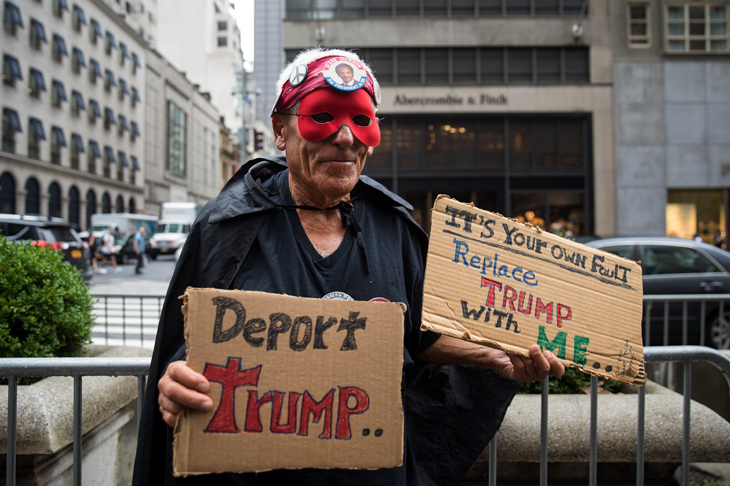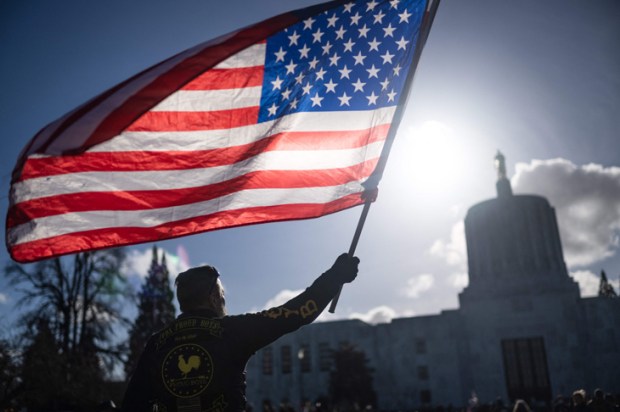In early 2017, as feminists in pink pussy hats marched in shocked outrage at the election of President Trump, a Republican grandee addressed a private think tank in midtown Manhattan. His message was dramatic. From now on, he said, everything would be unprecedented, because Trump was unprecedented, and the Left didn’t understand him. The US was headed for a cultural civil war, the seeds of which had been sown in the hippie-dominated late 1960s. He predicted increasing violence and anger as confrontation developed and the Left felt its power ebbing. Moreover, we were only in the early stages of this confrontation.
Listening, I felt my thoughts crystallising. Having spent three years living in Manhattan observing the extraordinary rise of Trump, I too felt that something new was happening. For only the second time in my life, I had the giddying sense of the tectonic plates of Western culture rearranging themselves, of the zeitgeist changing, of new values coming to prominence, of stale orthodoxies being cast aside. The first time I had felt a similar change was in the late ‘60s, when I was a teenager accustomed to the torpor of a stable, Liberal party-dominated postwar Australia. Quite suddenly the music changed, the streets were full of protests and the media was full of California-influenced hippies tearing down the old world. Vietnam war demos, women’s liberation, new sexual mores, minority rights… it was the Don’s Party era, when Whitlam and Labor came charging in with cool new policies and the Liberals were the party of history, of old men and exhausted ideas.
Now, in Manhattan after Brexit and then Trump, it was the establishment Leftists in the US who looked tired and out-of-touch, and they and their acolytes in the media, universities and Hollywood who were conservatively resisting a blast of change. Here in Australia, the sounds of cultural warfare are far dimmer, and there is little appreciation of the depths of what is unfolding in Europe and the US. It is as if we are some miles behind the battlelines, watching occasional explosions on the horizon but assuming that life in our little hamlet will go on as usual. The galvanising issues of the day – immigration, race and identity politics, globalisation vs nationalism, elites vs outsiders, culture wars, Islam – arrive, but are seen through the largely Leftist lens of our mainstream media. Insightful Dilbert cartoonist Scott Adams says two movie narratives are playing out across the US, and people’s reactions to current events depend on which movie they are watching. In Australia, with some honourable media exceptions, we seem to be getting just the one movie. An old friend, confined by ill health to his home and hence a big consumer of the mainstream media, looked at me in amazement when I talked about some of Trump’s triumphs and said stubbornly, his jaw set: ‘I never hear anyone else saying that stuff.’ Easy to see which movie he is watching.
I have yet to meet an ABC/Fairfax media consumer who has a good word to say for Trump, yet 63 million Americans voted for him, the US economy is booming and he has record 90 per cent approval ratings from Republicans. ABC and Fairfax consumers see him as a cartoon-like figure, worthy only of derision, and soon to be upended by Mueller’s Russian collusion inquiry. They know little to nothing of the arguably more consequential and slowly unfolding intelligence agency abuse of power (dubbed ‘Spygate’ by Trump) in which around a dozen top FBI and DoJ officials have been fired, have quit or been otherwise removed, and which Fox’s top-rated host Sean Hannity labels as ‘bigger than Watergate’. But it’s not big enough for the ABC to cover: while the ABC has over 6,000 entries under ‘Mueller inquiry’, a mere four exist for ‘Spygate’ and only one of those refers to the Trump matter, dismissively.
Subjects that I assume to be common knowledge turn out to be mysterious conversation-stoppers to my Aussie friends and family. The day that UK right-wing activist Tommy Robinson was arrested outside Leeds court and jailed within five hours, I mentioned it to two relatives, both professional women. I didn’t expect them to know of Robinson, which they didn’t, but I tried to explain the issue by referring to Rotherham, which I did expect them to know about. ‘What’s Rotherham?’ They knew nothing of the largely Pakistani child sex grooming gangs with which that UK town is now forever associated. My leftist 30-year-old relative postulated that it was fake news. She checked her friends; none of them knew about it either. After investigating the issue online and realising its enormity, she said innocently: ‘It just doesn’t seem to have been reported much here.’ Which was exactly the point.
Rotherham is the UK town of organised child sex grooming gangs, where some 1,400 girls as young as 11 were abused, raped and sexually trafficked over more than two decades. Some died. Worse, officialdom turned a blind eye, in part because of fear of seeming racist since many of the alleged offenders were either Pakistani and/or Muslim.
Type Rotherham into Google and up come over 16 million entries. Do the same on the ABC website and you get around 70 entries, with the first story halfway down the page, dated 2014.
Migrant crime is an issue the Left downplays, here and in Europe, because they lean towards open borders and cultural relativism. At some point in the ABC’s editorial chain, decisions were made not to prioritise reporting of this story. Control content, and you can largely control people’s opinions. It is not just bias in the presentation of issues that matters, but the stories that do get told and those that are ignored.
A former journalist, I was privileged to be in the box seat for an electrifying political change in the West’s dominant nation, the US. My three years of media exposure left me with an informed perspective on the issues in play, the reporters worth listening to and those past their best, the up-and-coming commentators, and those who set the agenda.
Without a similar experience and perspective, it is simply too hard for most people to wade through the morass of US and European news websites that pop up online, to then work out what is real and what is fake news. Which outlets are good? Which ones do the locals read and trust? And so I decided to set up a centre-right news aggregator website I’ve called tipofthespear.com.au to make it easier for the likeminded to follow what is happening in the other movie narrative. And why Tip Of The Spear? It’s the idea of trailblazing, from a military analogy referring to a small elite force that breaches enemy positions. Think of it as dispatches from the frontline. Please visit. Happy reading!
Got something to add? Join the discussion and comment below.
Get 10 issues for just $10
Subscribe to The Spectator Australia today for the next 10 magazine issues, plus full online access, for just $10.
You might disagree with half of it, but you’ll enjoy reading all of it. Try your first month for free, then just $2 a week for the remainder of your first year.














Comments
Don't miss out
Join the conversation with other Spectator Australia readers. Subscribe to leave a comment.
SUBSCRIBEAlready a subscriber? Log in